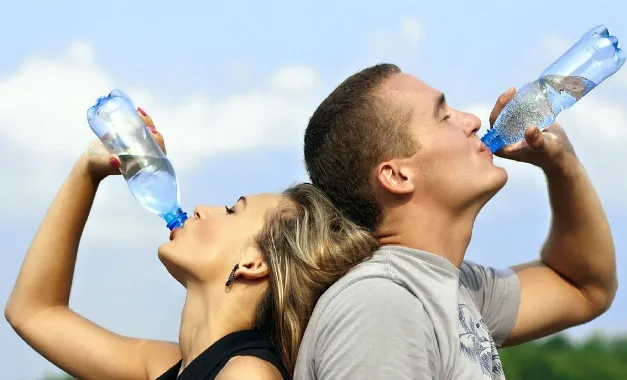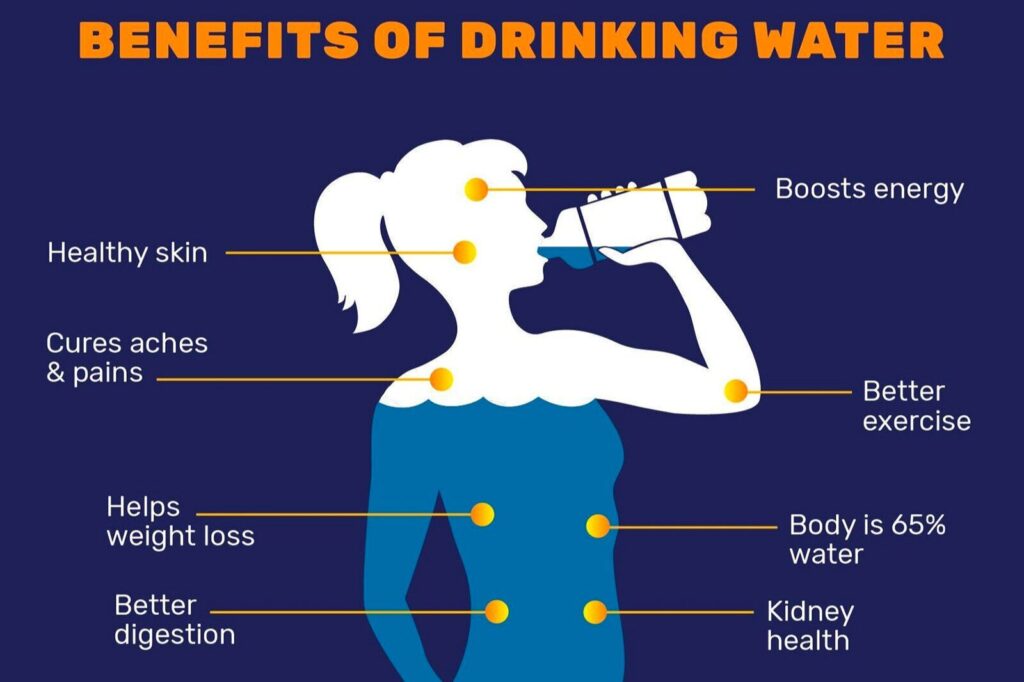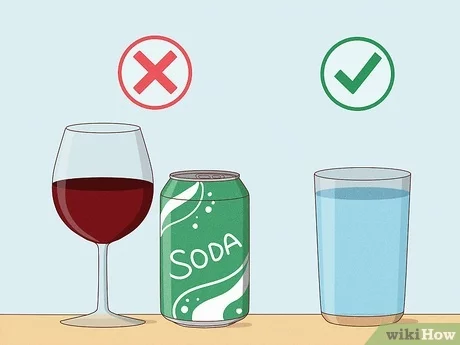
The Role Of Hydration In Weight Loss Losing weight often brings to mind images of intense exercise and strict diets. While these are important, a crucial yet often...
The Role Of Hydration In Weight Loss
Losing weight often brings to mind images of intense exercise and strict diets. While these are important, a crucial yet often overlooked aspect of weight management is the connection between hydration and weight loss. Water, the elixir of life, does more than just quench your thirst; it acts as a silent partner in your weight loss journey, optimizing your body's fat-burning processes.
In the pursuit of weight loss, many individuals focus primarily on diet and exercise, often overlooking a fundamental aspect of health, hydration. Water is an essential component of our body, making up approximately 60% of our total body weight. It plays a crucial role in various physiological processes, including metabolism, digestion, and thermoregulation. Adequate hydration not only supports these functions but also significantly impacts weight loss.
Let’s find out the medical aspects of hydration, examining how it influences weight loss.
The Science of Hydration and Weight Loss

Metabolism and Energy Expenditure
Water is integral to metabolic processes. It acts as a solvent for biochemical reactions, facilitates nutrient transport, and helps regulate body temperature. A well-hydrated body ensures efficient metabolic functioning, which is critical for weight loss. Research has shown that drinking water can temporarily boost metabolism.
A study published in the Journal of Clinical Endocrinology and Metabolism found that drinking 500 ml of water increased metabolic rate by 30% for about 30-40 minutes. This increase in energy expenditure, known as water-induced thermogenesis, can aid in burning calories.
Appetite Regulation
Proper hydration contributes to appetite management. The hypothalamus, the part of the brain responsible for regulating hunger and thirst, can sometimes confuse thirst with hunger. This misinterpretation can lead to unnecessary calorie consumption. Drinking water before meals can promote a sense of fullness, reducing overall calorie intake. A study in Obesity journal found that individuals who drank 500 ml of water before meals lost 44% more weight over 12 weeks compared to those who did not.
Digestion and Nutrient Absorption
Water is essential for digestion and nutrient absorption. It aids in the breakdown of food, facilitates the movement of nutrients into cells, and helps eliminate waste products. Adequate hydration ensures optimal gastrointestinal function, preventing constipation and promoting regular bowel movements, which are crucial for weight management. Dehydration, on the other hand, can slow down digestion, leading to bloating and discomfort, which can impede weight loss efforts.
Fat Oxidation
Fat oxidation, the process of breaking down fat molecules for energy, requires water. Proper hydration enhances this process, facilitating the utilization of stored fat as an energy source. A study published in Frontiers in Nutrition highlighted that increased water intake positively affects lipolysis, the breakdown of fats, particularly when combined with a calorie-restricted diet. This underscores the importance of maintaining hydration for effective fat loss.
Medical Insights into Hydration and Weight Loss

Cellular Function and Detoxification
Water is vital for maintaining cellular health and facilitating detoxification processes. Cells rely on water to transport nutrients, remove waste, and maintain structural integrity. Proper hydration supports liver and kidney function, organs crucial for detoxification. When the body is dehydrated, these organs cannot function optimally, leading to the accumulation of toxins and metabolic waste, which can hinder weight loss.
Blood Volume and Circulation
Hydration influences blood volume and circulation, which are essential for nutrient and oxygen delivery to tissues. Proper blood flow supports physical activity, which is a cornerstone of weight loss. Dehydration can lead to reduced blood volume, decreased circulation, and impaired exercise performance. Staying hydrated ensures that muscles receive adequate oxygen and nutrients during workouts, enhancing endurance and recovery.
Hormonal Balance
Hydration impacts the balance of hormones related to weight regulation, such as insulin and cortisol. Insulin regulates blood sugar levels and fat storage, while cortisol, a stress hormone, can influence fat distribution. Dehydration can lead to elevated cortisol levels, promoting fat storage, particularly around the abdomen. Maintaining hydration helps regulate these hormones, supporting weight loss efforts.
Practical Tips for Optimal Hydration
Calculate Your Water Needs
Factors like age, weight, activity, and climate determine individual water requirements. A general recommendation is to drink approximately eight 8-ounce servings of water each day, commonly known as the 8x8 rule. However, a more personalized approach involves calculating water needs based on body weight, typically, drinking half an ounce to an ounce of water per pound of body weight.
Monitor Hydration Status
Monitoring hydration status can help ensure adequate water intake. One simple method is observing urine color; pale yellow indicates proper hydration, while darker urine suggests dehydration. Additionally, paying attention to thirst signals and drinking water consistently throughout the day can prevent dehydration.
Incorporate Hydrating Foods
Incorporating hydrating foods into the diet can enhance overall hydration. Fruits and vegetables such as watermelon, cucumbers, oranges, and strawberries have high water content and provide essential vitamins and minerals. Including these foods can contribute to daily water intake and support weight loss efforts.
Set Hydration Goals
Setting specific hydration goals can help maintain consistency. For example, aim to drink a glass of water upon waking, before meals, and during and after physical activity. Using a water bottle with marked measurements can also help track intake and stay on target.
Avoid Dehydrating Beverages

Certain beverages, such as those containing caffeine and alcohol, can have diuretic effects, leading to increased water loss. While moderate consumption is generally acceptable, balancing these beverages with adequate water intake is important to prevent dehydration.
Beyond Calories: The Indirect Benefits of Hydration
The influence of hydration on weight loss extends beyond direct calorie burning. Adequate water intake:
- Aids Digestion: Water facilitates the breakdown and absorption of nutrients from food. This ensures efficient utilization of calories and prevents the accumulation of waste products that can hinder digestion.
- Supports Kidney Function: Your kidneys play a vital role in filtering waste products and regulating fluid balance. Dehydration can impair kidney function, leading to water retention and bloating, affecting your weight perception.
- Boosts Energy Levels: When dehydrated, your body works harder to perform basic functions. Adequate water intake helps maintain energy levels, allowing you to be more active and engage in weight-loss activities.
- Improves Mood and Sleep: Dehydration can affect your mood and sleep quality, both of which can impact your weight management efforts. Water helps maintain focus, reduces stress hormones, and promotes restful sleep, contributing to a healthy weight loss mindset.
Conclusion
Hydration plays a pivotal role in weight loss by supporting metabolic processes, regulating appetite, enhancing digestion, and facilitating fat oxidation. Understanding the medical aspects of hydration and implementing practical strategies can significantly impact weight loss efforts.
At LifeRx.md, we emphasize the importance of a holistic approach to health and wellness. Incorporating proper hydration into a comprehensive weight loss plan can lead to sustainable and effective results.
Remember, staying hydrated is not just about drinking water, it's about supporting your body's overall health and optimizing its ability to lose weight.